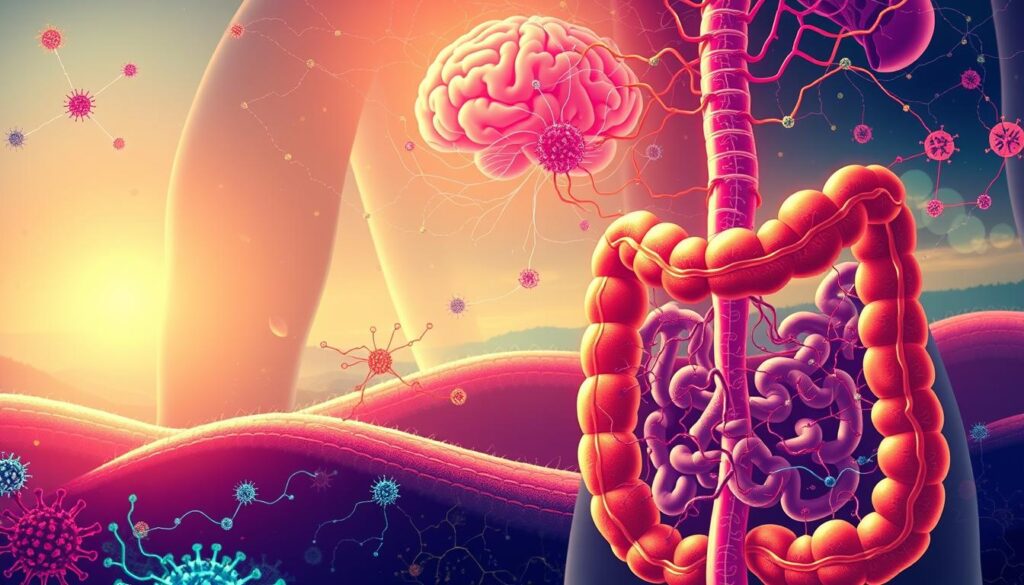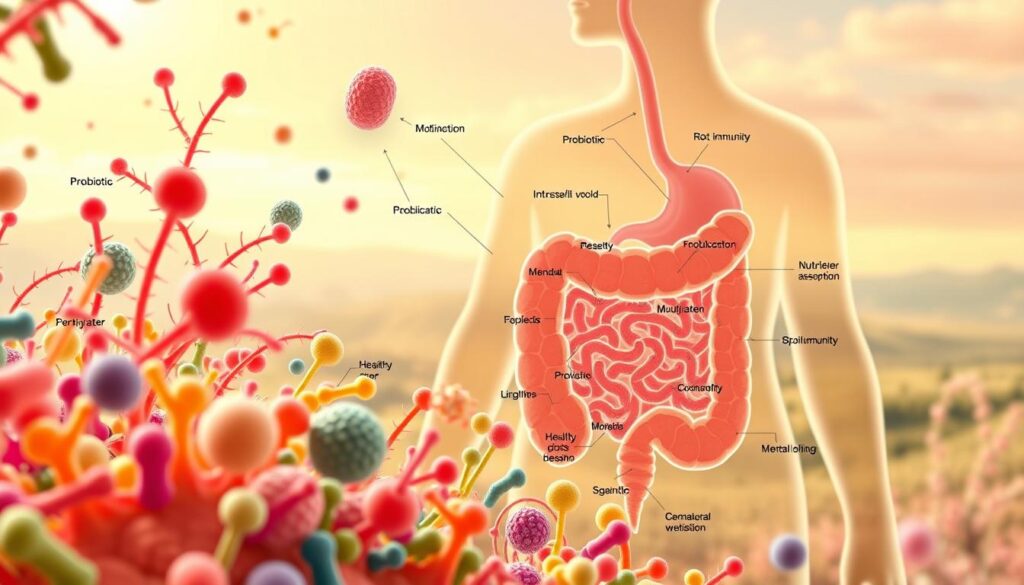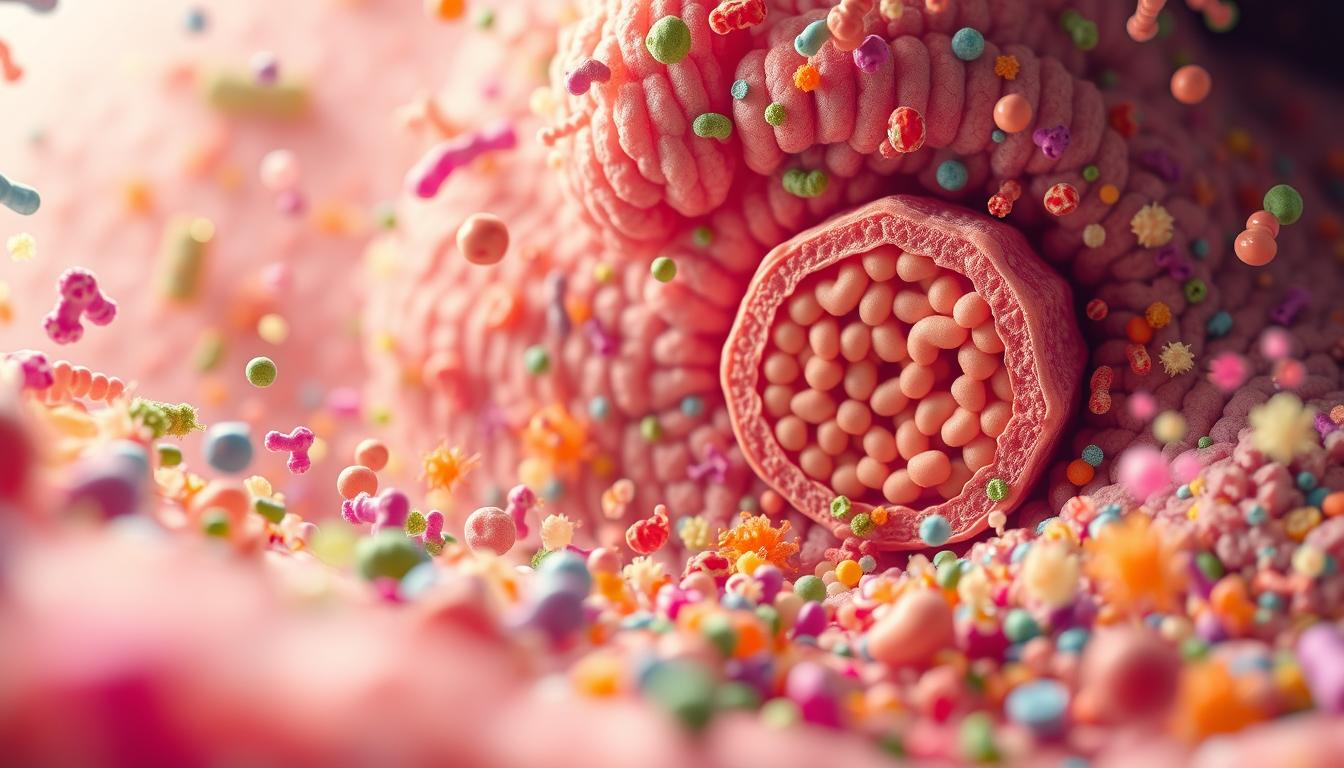Have you ever wondered why some people seem to thrive while others struggle with low energy and frequent discomfort? The answer might lie in an often-overlooked aspect of wellness—your digestive system.
Recent studies highlight how a well-functioning internal ecosystem supports immunity, mental clarity, and overall vitality. From fermented foods like kimchi to science-backed supplements, more people are discovering ways to nurture their body’s natural defenses.
Modern diets and stress can disrupt this delicate harmony. But solutions like Root’s Microbiome Balance—a blend of botanicals such as berberine sulfate—offer targeted relief for bloating and irregular digestion. Ready to explore how small changes can make a big difference?
Why Gut Health Matters for Immunity and Mental Well-Being
Your digestive system does more than process food—it shapes your immunity and emotions. Nearly 70% of your immune system resides in your belly, and research shows a direct link between your inner ecosystem and mental clarity.

The Gut-Brain Connection
Your belly and brain communicate constantly. Serotonin, the “feel-good” hormone, is mostly produced in your digestive tract. When beneficial bacteria thrive, they help regulate mood and reduce stress hormones like cortisol.
Studies suggest imbalances may contribute to anxiety. For example, probiotics have been shown to lower cortisol by up to 20% in clinical trials.
How Your Microbiome Supports Immune Function
Your gut houses gut-associated lymphoid tissue (GALT), a frontline defense against pathogens. When harmful bacteria outnumber good ones, it can trigger:
- Chronic inflammation
- Frequent infections
- Autoimmune reactions
Root’s approach combines microbiome support with Vitamin D3 K2, a duo shown to enhance immune responses. Small changes, like fermented foods or targeted supplements, can restore harmony.
Understanding the Gut Microbiome: Your Inner Ecosystem
Your belly isn’t just digesting food—it’s home to trillions of tiny helpers. These microbes form a complex network called the gut microbiome, influencing everything from nutrient absorption to immune defense.

What Is a Healthy Microbiome?
A balanced inner ecosystem hosts over 1,000 bacterial species working together. Diversity is key: more species mean better resilience against harmful invaders.
When this balance tips (called dysbiosis), problems arise. Harmful bacteria may overgrow, or essential species vanish. Common triggers include antibiotics and low-fiber diets.
Key Roles of Gut Bacteria
These tiny powerhouses perform critical jobs:
- Nutrient synthesis: Produce vitamins like K and B12.
- Fiber fermentation: Break down plant fibers for energy.
- Toxin neutralization: Protect the colon from harmful compounds.
| Function | Impact |
|---|---|
| Vitamin Production | Supports blood clotting (vitamin K) and energy (B vitamins) |
| Fiber Breakdown | Boosts digestion and reduces bloating |
| Immune Defense | Trains immune cells in the bowel |
Slow motility (food movement) can lead to SIBO, where bacteria overgrow in the wrong areas. Tools like Root’s GI Map test ($399) analyze your unique microbiome to guide fixes.
To protect your inner allies, prioritize fiber-rich foods and avoid unnecessary antibiotics. Small steps keep this ecosystem thriving.
What Are Probiotics? The Basics
Not all bacteria are bad—some, like probiotics, are essential for daily wellness. These live microbes work to maintain harmony in your digestive system, especially after disruptions like antibiotics or poor diet.

Live Microbes and Their Benefits
Beneficial bacteria in probiotics help combat imbalances by crowding out harmful strains. For example, Lactobacillus supports nutrient absorption, while Bifidobacterium aids in reducing inflammation.
Common Probiotic Strains
Not all strains do the same job. Here’s a quick comparison:
- L. rhamnosus: Helps ease diarrhea and travel-related discomfort.
- B. longum: Targets inflammation and supports immune function.
When choosing a supplement, look for:
- High CFU counts (colony-forming units) for potency.
- Delayed-release capsules to survive stomach acid.
- Third-party testing for quality assurance.
Natural sources like yogurt, kefir, and miso also deliver these beneficial bacteria. Avoid unregulated products—opt for trusted brands with verified strains.
How Probiotics Support Gut Health and Microbiome Balance
The key to better digestion and stronger immunity might be hiding in tiny, living helpers. These beneficial bacteria work silently to keep your system running smoothly.

Restoring Microbial Diversity
Probiotics help repopulate your system with good microbes. They crowd out harmful strains like C. difficile, which can disrupt microbiome balance.
Root’s 5R gut repair strategy simplifies the process:
- Remove toxins and pathogens.
- Replace enzymes for better absorption.
- Repopulate with targeted probiotics.
- Repair the intestinal lining.
- Rebalance long-term through diet.
Combating Dysbiosis
Dysbiosis occurs when bad bacteria overwhelm the good. Symptoms like bloating or fatigue often follow. Kelly, a Root customer, saw her bloating vanish in a week using Microbiome Balance.
Fixing this imbalance also boosts nutrient uptake and skin clarity. Here’s how probiotic forms compare:
| Form | Best For | Survival Rate |
|---|---|---|
| Capsules | Travel; delayed release | High (stomach acid-resistant) |
| Powders | Quick absorption | Moderate (mix with liquids) |
For lasting microbiome balance, pair probiotics with fiber-rich foods. This fuels the good bacteria already working for you.
Signs Your Gut Microbiome Needs Support
Feeling off but can’t pinpoint why? Your digestive system might be sending signals. When your inner ecosystem is out of sync, it often shows through subtle yet persistent symptoms.

Bloating, Gas, and Irregular Digestion
Bloating after meals or frequent gas are common red flags. These issues often stem from poor food breakdown or bacterial imbalances. Root’s Microbiome Balance targets these concerns, especially urgency and irregular bowel movements.
Watch for these warning signs:
- Chronic constipation or diarrhea
- Undigested food particles in stool
- Sudden intolerance to foods you once enjoyed
Food Sensitivities and Fatigue
New sensitivities to dairy or gluten may signal dysbiosis. Harmful bacteria can trigger histamine reactions, leading to migraines or skin rashes. Fatigue often follows due to malabsorption of iron and B vitamins.
| Symptom | Possible Cause | Solution |
|---|---|---|
| Bloating | Bacterial overgrowth | Root’s Low FODMAP Prebiotic ($37) |
| Fatigue | Nutrient deficiencies | Iron/B12-rich foods + probiotic support |
Track meals and symptoms in a food diary. This helps identify triggers before considering tests like GI mapping. Small tweaks can restore comfort and energy.
Top-Rated Gut Health Products to Consider
Finding the right products for digestive wellness can feel overwhelming with so many options. From targeted supplements to fermented foods, we’ve narrowed down the best choices backed by science and reviews.
Root’s Microbiome Balance: A Closer Look
This supplement combines magnesium caprylate and berberine sulfate—two potent ingredients for tackling bloating and bacterial overgrowth. Customers rate it 5 stars for easing SIBO symptoms within weeks.
What sets it apart:
- Third-party tested for purity (walnut-free formula).
- Works alongside dietary changes for lasting results.
- Delayed-release capsules ensure live bacteria reach the intestines.
Fermented Foods with Live Cultures
Not all fermented products are equal. GT’s Synergy kombucha packs 4 billion CFUs per serving, while sugary yogurts often lack active bacteria. For probiotic-rich options:
- Unpasteurized sauerkraut (refrigerated section only).
- Kefir with 12+ strains like L. casei.
- Miso paste for soups (look for “live cultures” on labels).
Pair these with Root’s Low FODMAP Prebiotic ($37) for fiber support. Unlike synthetic fibers, it feeds good bacteria without causing gas.
How to Choose the Right Probiotic Supplement
Selecting the best probiotic supplement can feel confusing with endless options. The right choice depends on strain specificity, potency, and delivery method—all critical for supporting your digestive tract.
Strain Specificity and CFUs Matter
Not all probiotics work the same. Look for strains like L. acidophilus for lactose digestion or B. lactis for immune support. CFUs (colony-forming units) indicate potency:
- 10–50 billion CFUs: Ideal for most adults.
- Higher counts (50B+) suit post-antibiotic recovery.
- Root’s Microbiome Balance uses 15B CFUs per capsule.
Capsules vs. Liquids vs. Powders
Delivery form affects survival in stomach acid. Here’s how they compare:
| Form | Pros | Cons |
|---|---|---|
| Capsules | Delayed-release; survives acid | Slower absorption |
| Liquids | Fast-acting | Requires refrigeration |
| Powders | Mixable; shelf-stable | Lower survival rates |
Avoid products with artificial additives—they may trigger side effects like bloating. For synergy, try Root’s Gut Health Bundle, pairing probiotics with prebiotic fiber.
Lifestyle Habits for a Healthy Gut
Small daily choices shape your digestive wellness more than you might realize. From what you eat to how you manage stress, these habits fuel a healthy gut and stronger immunity.
Fuel with Fiber and Prebiotics
Dietary fiber feeds the good bacteria in your system. Foods like garlic, onions, and asparagus are rich in prebiotics—compounds that help beneficial microbes thrive.
High-fiber diets also produce short-chain fatty acids (SCFAs), which support colon health. Try these easy swaps:
- Swap white rice for quinoa or lentils.
- Add flaxseeds to smoothies for extra fiber.
- Choose whole fruits over juices.
Reduce Stress and Toxins
Chronic stress slows digestion and alters gut motility. Mindfulness practices like deep breathing can lower cortisol, reducing dysbiosis risk.
Avoid common toxins that harm your lining:
- Limit NSAIDs (e.g., ibuprofen) and alcohol.
- Opt for organic produce to reduce pesticide exposure.
- Test for food triggers with Root’s Mediator Release Test ($595).
Hydration is key—aim for half your body weight in ounces of water daily. This keeps bowel movements regular and flushes out waste.
Common Gut Health Conditions Linked to Dysbiosis
Modern science reveals unexpected connections between digestion and disease. When your internal ecosystem falters, it can trigger or worsen various conditions—from bloating to chronic inflammation. Understanding these links helps target solutions more effectively.
When Bacteria Go Rogue: SIBO and IBD
SIBO (small intestinal bacterial overgrowth) occurs when bacteria invade the wrong areas. This causes hydrogen-dominated bloating, acid reflux, and malabsorption. Root’s herbal antimicrobial blend—containing oregano oil and berberine—offers a non-antibiotic approach.
Inflammatory bowel disease (IBD) like ulcerative colitis often flares with reduced Akkermansia bacteria. This protective strain helps maintain the colon lining. For IBD patients, Root’s GI Map test ($399) identifies specific imbalances needing correction.
The Heart-Gut Connection: Atherosclerosis
Emerging research ties dysbiosis to arterial plaque. Harmful gut bacteria produce TMAO, a compound that accelerates atherosclerosis. Simple steps to support your inner ecosystem may reduce this risk:
- Increase polyphenol-rich foods (berries, dark chocolate)
- Consider targeted supplements like Root’s Microbiome Balance
- Test for bacterial overgrowth if experiencing persistent bloating
These conditions share a root cause—disrupted bacterial harmony. Addressing dysbiosis through diet and smart supplementation can restore balance from the inside out.
Conclusion: Building a Healthier Gut for Life
Taking charge of your digestive wellness starts with simple, science-backed steps. Root’s 5R protocol—test, supplement, and maintain—helps members like Brittany overcome bacterial overgrowth in just two months.
Pair targeted solutions like Microbiome Balance with fiber-rich meals for lasting results. Brittany’s story proves even stubborn bloating fades with the right support.
For holistic care, combine probiotics with Vitamin D3 K2 to boost your immune system. Root’s meal plans and community make consistency effortless.
Ready to start? Explore Root’s Gut Health Bundle today—your first step toward lifelong balance.
